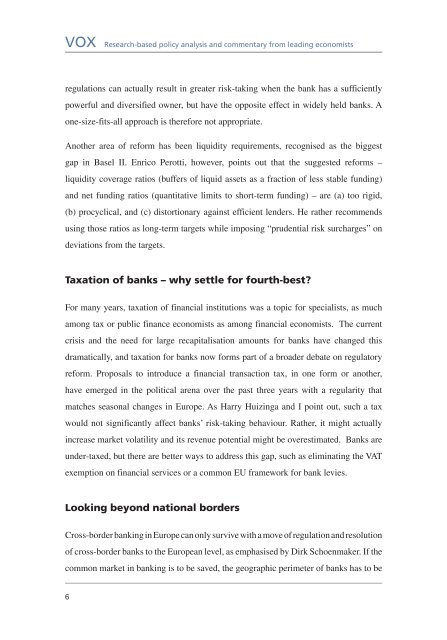You also want an ePaper? Increase the reach of your titles
YUMPU automatically turns print PDFs into web optimized ePapers that Google loves.
VOX Research-based policy analysis and commentary from leading economists<br />
regulations can actually result in greater risk-taking when the bank has a sufficiently<br />
powerful and diversified owner, but have the opposite effect in widely held banks. A<br />
one-size-fits-all approach is therefore not appropriate.<br />
Another area of reform has been liquidity requirements, recognised as the biggest<br />
gap in Basel II. Enrico Perotti, however, points out that the suggested reforms –<br />
liquidity coverage ratios (buffers of liquid assets as a fraction of less stable funding)<br />
and net funding ratios (quantitative limits to short-term funding) – are (a) too rigid,<br />
(b) procyclical, and (c) distortionary against efficient lenders. He rather recommends<br />
using those ratios as long-term targets while imposing “prudential risk surcharges” on<br />
deviations from the targets.<br />
Taxation of banks – why settle for fourth-best?<br />
For many years, taxation of financial institutions was a topic for specialists, as much<br />
among tax or public finance economists as among financial economists. The current<br />
crisis and the need for large recapitalisation amounts for banks have changed this<br />
dramatically, and taxation for banks now forms part of a broader debate on regulatory<br />
reform. Proposals to introduce a financial transaction tax, in one form or another,<br />
have emerged in the political arena over the past three years with a regularity that<br />
matches seasonal changes in Europe. As Harry Huizinga and I point out, such a tax<br />
would not significantly affect banks’ risk-taking behaviour. Rather, it might actually<br />
increase market volatility and its revenue potential might be overestimated. Banks are<br />
under-taxed, but there are better ways to address this gap, such as eliminating the VAT<br />
exemption on financial services or a common EU framework for bank levies.<br />
Looking beyond national borders<br />
Cross-border banking in Europe can only survive with a move of regulation and resolution<br />
of cross-border banks to the European level, as emphasised <strong>by</strong> Dirk Schoenmaker. If the<br />
common market in banking is to be saved, the geographic perimeter of banks has to be<br />
6














